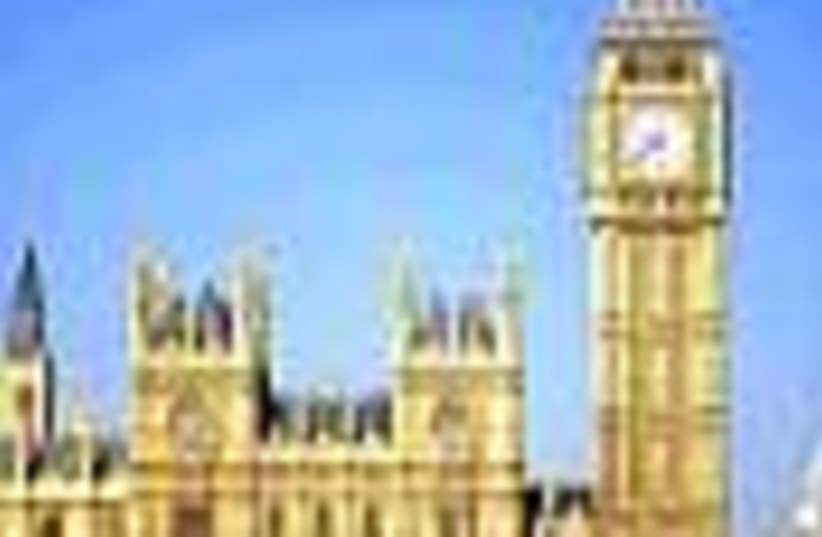Britain's fateful vote
The vote on UK terrorism laws puts at stake nothing less than providing the country with the tools it needs to confront a murderous religious extremism.
The prime minister's popularity continues to hemorrhage. Though his party leads Parliament, he cannot count on winning a crucial vote without a tough fight. The government's number one agenda item is the threat of terrorism. A popular young foreign minister - a protégé of the previous leader - waits in the wings to displace him.
This is the scene as the British House of Commons prepares to decide today on what is perceived as - but isn't - a vote of confidence in the leadership of Prime Minister Gordon Brown.
At issue is the government's Counter Terrorism Bill, which was introduced by Home Secretary Jacqi Smith. The legislation would allow the pre-charge detention of terrorist suspects to be extended from 28 to 42 days in exceptional circumstances; stiffen prison terms for convicted terrorists; allow for legal proceedings to be heard without a jury at the home secretary's discretion, and permit the public to be barred from national security trials. It would also confer additional powers, enabling the government to gather and share information for counter-terrorism purposes; amend the law relating to asset-freezing procedures, and curtail the civil liberties of paroled terrorists.
EXPANDING THE pre-charge detention period is needed, proponents argue, because of the severity and complexity of the Islamist threat. Authorities need more time to untangle plots and decipher encrypted material in Arabic.
So worried is the Labor government that it might lose the vote that it instructed Foreign Secretary David Miliband to cut short his visit to our region so he could take part in procedural hurdles leading up to the fateful Commons vote. Miliband met with PA Prime Minister Salaam Fayad in Ramallah on Monday and was scheduled to meet with Prime Minister Ehud Olmert, but instead rushed home yesterday morning.
The bill faces opposition not only from the resurgent Conservative Party and the Liberals, but also from about 30 rebels inside Labor.
The Conservatives argue that the bill is political - designed to make Brown look tough on security. Opposition Leader David Cameron condemns the plan as bad for civil liberties and potentially alienating Britain's 1.6 million Muslims. Nick Clegg, the Liberal Democrat leader, says there is no "compelling evidence" that an extension is necessary.
Yesterday, Trevor Phillips, chair of the Equality and Human Rights Commission, a non-departmental public body independent of the government, announced that if the bill became law he would launch a legal challenge at the first opportunity. Grassroots opposition is being spearheaded by the Muslim Council of Britain, Amnesty International and Liberty, whose director, Shami Chakrabart, released 42 balloons outside Parliament yesterday to highlight his group's antagonism toward the proposals.
To allay legitimate concerns of civil libertarians and British Muslims, the government said it would compensate - at up to £3,000 per day - any person held beyond the current 28-day limit who is subsequently proven innocent.
With two-thirds of voters in favor, the bill has plenty of popular support, including from Khurshid Ahmed, leader of the moderate British Muslim Forum, who said: "I am reassured safeguards proposed go a long way in protecting civil liberties. As we saw in the July 7 attacks, Muslims are just as likely to be victims of plots as any other British people."
Also for the bill are Metropolitan Police Commissioner Sir Ian Blair, Sir Hugh Orde, chief constable of Northern Ireland, and Peter Clarke, former head of police anti-terrorist operations. The secret services, however - including MI5 - have remained publicly neutral.
Even as the bill is being debated, the current threat level in Britain is "severe," meaning "an attack is highly likely." Brown has said that the security services are right now tracking 2,000 potential terrorists, 30 potential plots and 200 terror networks. "I've tried to build consensus around our proposals, but I am determined that we stick to our principles... that up to 42 days' detention is - and will be - necessary in the future."
WHILE WE do not impugn the motives of those who genuinely oppose this legislation on civil liberties grounds, this is one vote where partisan politics - kicking an unpopular politician when he's down - is thoroughly unacceptable. For at stake is nothing less than providing tolerant Britain, a nation from which so many others take their moral lead, with the tools it needs to confront a murderous religious extremism.
if(catID != 151){
var cont = `Take Israel home with the new
Jerusalem Post Store Shop now >>

